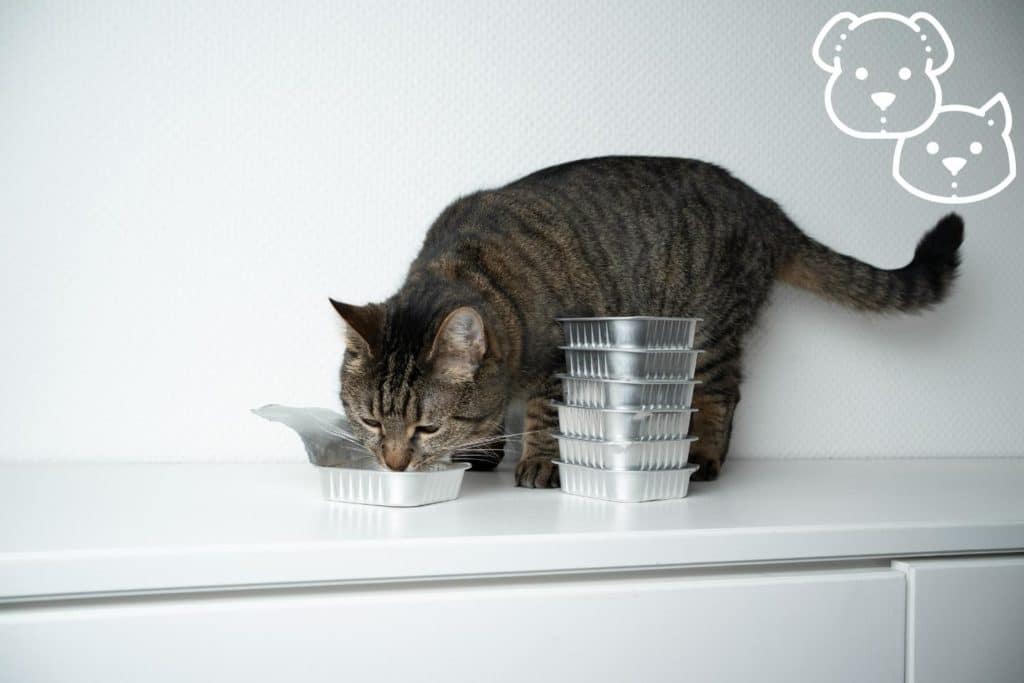
If your cat has eaten something poisonous, it’s important to act fast and get them to the vet right away. While on the other side, if your cat has been poisoned, it is important to act quickly and seek professional medical help.
Treatment will vary depending on the type of poison and how much your cat has ingested.
If your cat has food poisoning, you can do a few things to help them feel better. You can call these treatments home remedies.
Before moving forward, it’s necessary to figure out how your cat is poisoned, whether some food is responsible, a human medicine, plants, household cleaning agent, or really a dangerous rat poison he eats.
Our experts recently make a list of the best cat foods for shedding, so if you are dealing with shedding it can be a great help.
What Causes Poisoning in Cats?
Cats are adored for their curiosity. But, as the saying goes, if they ingest or come into touch with any harmful chemicals in and around the house, this curiosity can have unfortunate consequences.
Minimal irritation and discomfort may be caused by interaction with some poisons. On the other hand, others can rapidly harm and shut down vital organs, resulting in death.
Cats are less picky about what they eat than dogs when it comes to unknown substances, although they can still get into things they aren’t supposed to.
How to Know if Your Cat’s Been Poisoned
Signs of poisoning can range from minor to severe depending on the amount consumed. If your cat has eaten a poisonous substance, you may observe one or more:
- Vomiting (with or without blood)
- Diarrhea (with or without blood)
- Excessive salivation (drooling)
- Coughing
- Labored breathing
- Sneezing
- Rapid breathing
- Skin swelling or inflammation
- Depression
- Excitability
- Incoordination or unsteady gait
- Tremors
- Seizures
- Coma
- Anemia
- Fever
- Signs of kidney failure, such as polydipsia (increased thirst)
- Symptoms of liver failure, such as jaundice (yellowing of the skin)
- Increased heart rate
- Abdominal pain
Many of these symptoms can be caused by a minor illness or another more serious problem, so it’s critical to keep an eye on your pet and contact your veterinarian if you notice anything out of the ordinary.
Items that are Dangerous to Cats
Numerous harmful things may harm your cat, including everyday items in your cleaning cupboard and even some meals and plants.
Household cleaning agents: If your cat eats chemicals like bleach, laundry detergents, or dryer sheets, it can induce mouth and stomach ulcers, nausea, and vomiting.
- Antifreeze or ethylene glycol
- Fertilizers (containing potassium K, phosphorus, and nitrogen)
- Lead paint
- Bleach
- Detergent
- Disinfectants
Human medications: Even seemingly safe pain medications might have harmful effects if your cat consumes them. Acetaminophen (Tylenol), nonsteroidal anti-inflammatory drugs (NSAIDs), and aspirin and ibuprofen harm red blood cells and the kidneys, causing ulcers in the GI tract.
Plants: Lilies, azaleas, and rhododendrons should be avoided by cat guardians since even tiny amounts can induce significant kidney failure, comatoseness, and mortality in cats. Here are plants that are toxic for cats:
- Schefflera
- Pothos
- Lilies
- Ivy
- Chrysanthemum
- Autumn Crocus
- Amaryllis
- Yew
- Tulips
Some human foods: It may be tasty for you, but don’t give your pet anything out of it. Cats’ health can be harmed by many common meals, much like if we ate berries from an unknown plant.
Insecticides & rodenticides: These poisonous substances can cause severe harm to cats if ingested, including bleeding disorders, seizures, and death. Some examples are:
- Rat baits
- Ant baits
- Permethrin (insecticides)
- Metaldehyde (snail and slug repellent)
Diagnosis of Poisoning in Cats
Based on physical symptoms and markers, your veterinarian will be able to make a diagnosis of poisoning in a cat fast. Bring the box, product label, wrapper, or sample of the item with you if you saw or suspected the poisoning (a chocolate wrapper by the feline or chewed plant, for example).
Knowing what active ingredient is to blame can assist the veterinarian in determining an appropriate treatment plan and help your cat recover considerably faster.
Poisoning incidents may become fatal in a short period of time, so your veterinarian may conduct a brief medical history examination.
Treatment of Poisoning in Cats
The treatment for poisoning in cats is determined by the kind of toxin the cat was exposed to. Your veterinarian may give you various options for treating poisoning in cats, such as:
- An administration of ethanol (in cases of antifreeze poisoning)
- Fluid therapy (to help to flush the toxin from the body)
- Muscle relaxants (for tremors)
- Anti-seizure medication
- Induce vomiting
- Activated charcoal (an agent that binds with the toxin and prevents it from being absorbed by the body), is used in poisonings that cause internal bleeding or corrosion of the esophagus if vomiting is induced.
Recovery of Poisoning in Cats
The outlook for poisoning in cats is largely determined by the time that has passed since exposure and the poison involved. Therefore, the sooner your cat gets medical care, the sooner treatment may begin and the less time the contamination has to spread throughout his body.
Call your veterinarian for assistance with poisoning in cats in the future and advice on who to contact and at-home remedies you might use in an emergency.
You Might Also Like to Read:
- My cat ate dog food and is now sick
- Vet approved homemade cat food recipes
- Homemade cat food recipes for sensitive stomach
Tips to Keep the Cats Safe from Poisoning
There are a few ways to help keep your cat from being poisoned.
- Be mindful of what plants you bring into your home, as some can be harmful to cats. If you’re unsure about a plant’s toxicity, ask your veterinarian or research it online before bringing it into your home.
- Keep all medications, including over-the-counter drugs and vitamins, out of reach of cats. Even something as seemingly harmless as Tylenol can be dangerous to felines.
- Avoid using rat or mouse poison if possible, and if you must use it, make sure it’s in a place where your cat cannot access it.
- If you use insecticides or herbicides around the house or yard, make sure they’re in a safe place and that your cat can’t get to them.
- Never give your cat human food as a snack or meal. While some human foods may be okay in small doses, many can be harmful – even deadly – to cats.
- Keep the garbage can lid closed and secured, and don’t leave any food out on the counters or tables. t will help keep pests like rats and mice from being attracted to your home – and, in turn, help to keep your cat safe from poisoning.
By following these tips, you can help to keep your cat safe from poisoning.
